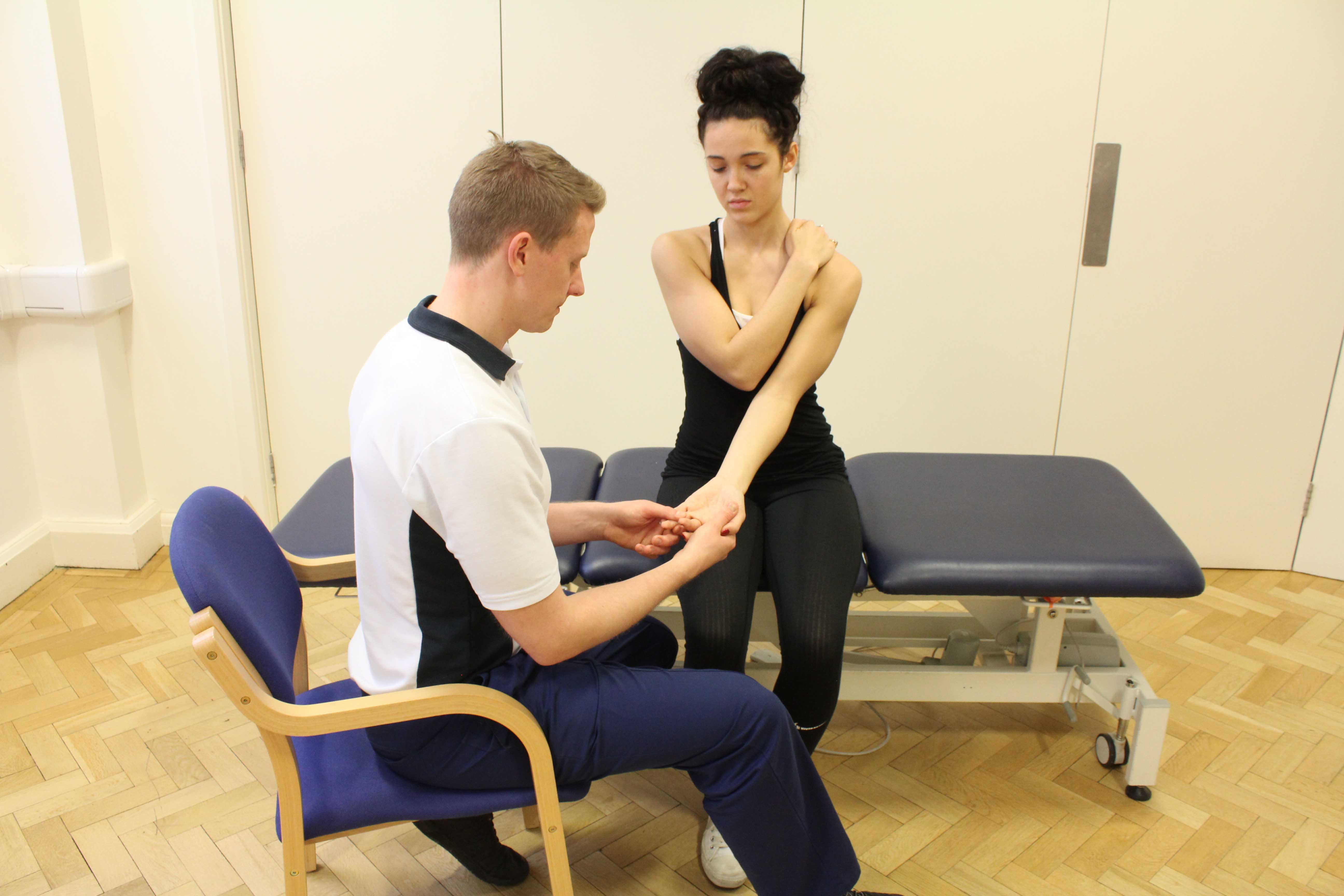What is a trigger finger?
Tendons are strong cords of connective tissue that connect muscle to bone which help to support powerful movements. Some tendons are protected in a layer called synovial sheath and when one of the tendons in the hand becomes stuck in the sheath, this is known as trigger finger. Physiotherapy is an important treatment for trigger finger.
What can cause a trigger finger?
It is not known what causes trigger finger but it is thought that inflammation of the sheath and/or tendon is partly responsible. Trigger finger can be caused by overuse of your palm such as using tools a lot or decorating. Trigger finger may also be a symptom of other conditions such as rheumatoid arthritis, diabetes and carpal tunnel syndrome. The condition is more common in women over the age of forty and in children under six.
 Above: Examination of trigger finger, repetative strain injury by experienced physiotherapist
Above: Examination of trigger finger, repetative strain injury by experienced physiotherapistWhat are the symptoms of a trigger finger?
You may experience pain and tenderness at the base of whichever finger is affected or over the palm area. Trigger finger will make it difficult for you to straighten one or more of the fingers in the hand and this will cause problems during simple tasks. You may notice nodules at the bases of the affected fingers which are areas of contracted tissue and this will also restrict your movement. It is common for a clicking sound to occur when you try and move the trigger finger and this is because of the tendon becoming stuck in the thickened synovial sheath. Other symptoms of trigger finger include:
What should I do if I have a trigger finger?
If you notice any of the symptoms of trigger finger, it is important that you seek professional advice as soon as possible. You doctor will examine your symptoms and be able to give you an accurate diagnosis of your condition and the severity of it. If the trigger finger is relatively mild, conservative (non-surgical) treatments are preferred and these include anti-inflammatory drugs and steroid injections to reduce the inflammation. Strapping and splinting may also be advised to help support the finger and prevent any further damage. If your trigger finger is very severe, surgery may be recommended. During the operation, the pulley (ligament) attaching the tendon to the bone will be cut to relieve some of the tension and help it move effectively again.
What shouldn’t I do if I have a trigger finger?
It is important that you don’t ignore your symptoms as they are likely to progress and will eventually make it very difficult for you to carry out everyday tasks and activities. Do not overuse the trigger finger as in rare cases, the extra strain may cause the tendon to rupture and this will require surgery.
Physiotherapy for a trigger finger.
Physiotherapy for trigger finger will focus on helping return your range of movement and strength with an exercise programme whether you have had surgery or not. Wax therapy, hydrotherapy and massage can also help reduce any pain you may have and help improve your movement. Electrotherapy techniques can be used to promote effective healing and these can include ultrasound and laser treatments. Your physiotherapist may choose to splint or tape your finger temporarily to support the area and minimise the risk of re-injury. Other physiotherapy treatments may include:
Can a trigger finger in the hand have any long-term effects?
If you do not seek medical help relatively quickly, the length of your recovery may be increased. If you have had surgery for you trigger finger, there are potential complications such as temporary nerve damage and stiffness that you may experience. Physiotherapy can assist with these problems but it is important to begin a physiotherapy treatment programme as soon as possible.
To arrange a physiotherapy appointment call Physio.co.uk on 0330 088 7800 or book online.

 0330 088 7800
0330 088 7800

































